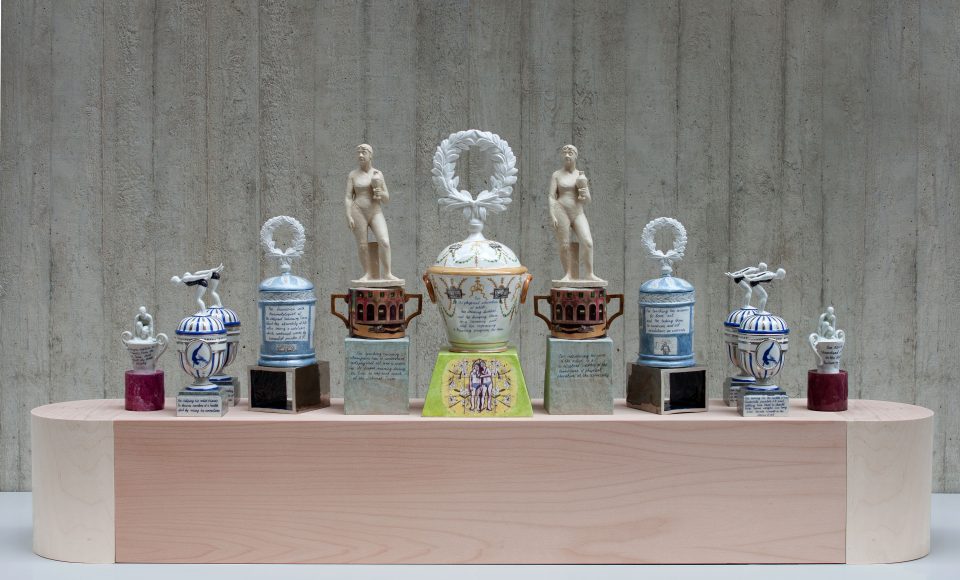
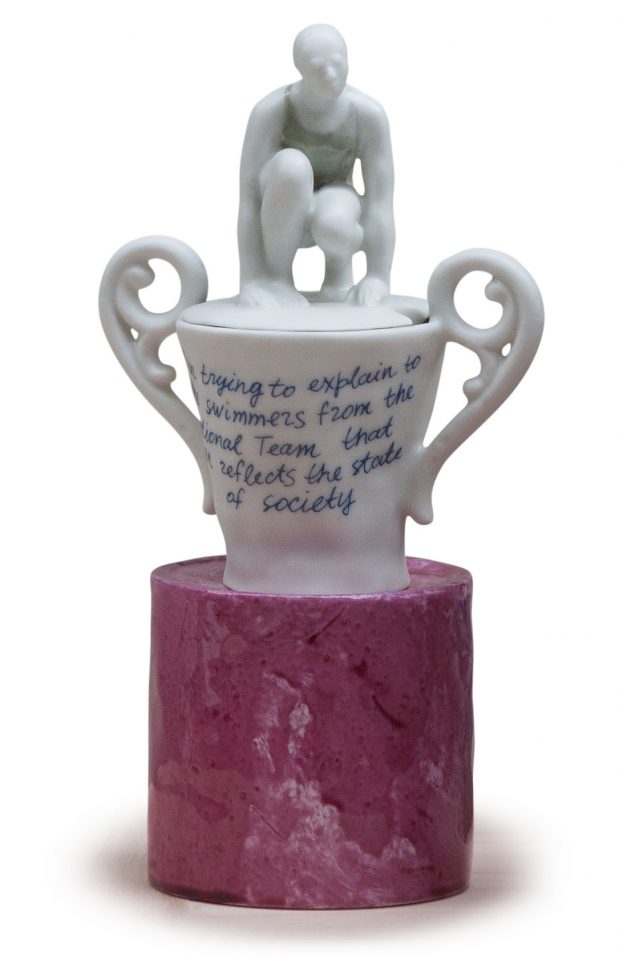 2.1-5aH ~18 cm | For trying to explain to the swimmers from the National Team that art reflects the state of society
2.1-5aH ~18 cm | For trying to explain to the swimmers from the National Team that art reflects the state of society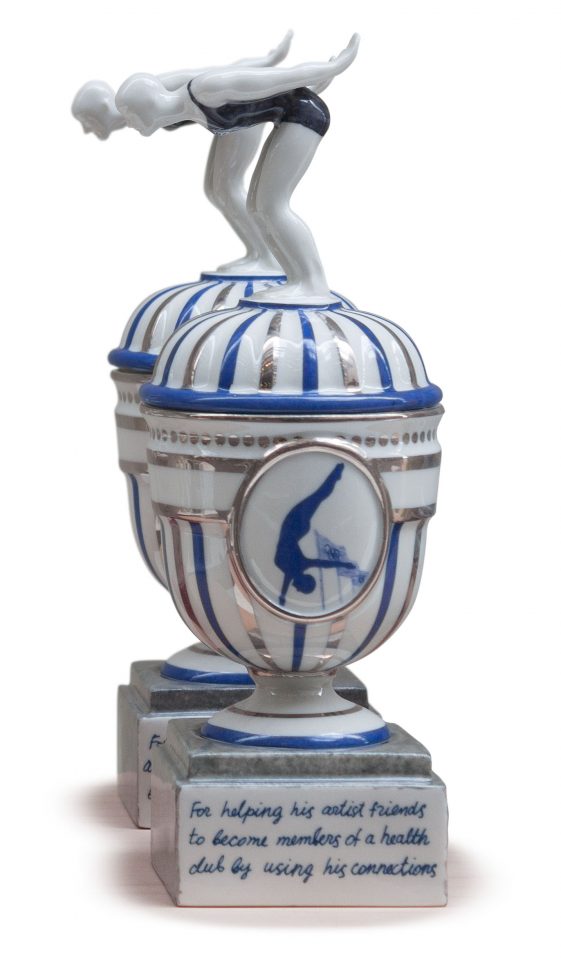 2.1-4a | 2.1-4bH ~25 cm | For helping his artist friends to become members of a health club by using his connections || H ~25 cm | For taking his artist friends to the sauna on the weekends so they could sweat out all the alcohol they had consumed during the week
2.1-4a | 2.1-4bH ~25 cm | For helping his artist friends to become members of a health club by using his connections || H ~25 cm | For taking his artist friends to the sauna on the weekends so they could sweat out all the alcohol they had consumed during the week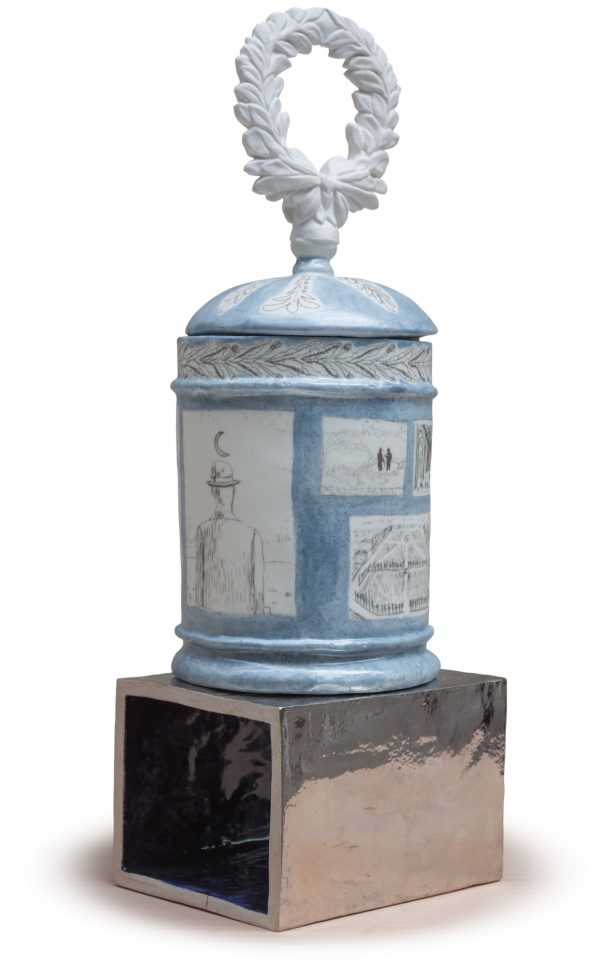 2.1-3aH ~33 cm | For discussions with the traumatologist of the National Swimming Team about the absurdity of life after seeing a catalogue which contained works from surrealist painter, R.M.
2.1-3aH ~33 cm | For discussions with the traumatologist of the National Swimming Team about the absurdity of life after seeing a catalogue which contained works from surrealist painter, R.M.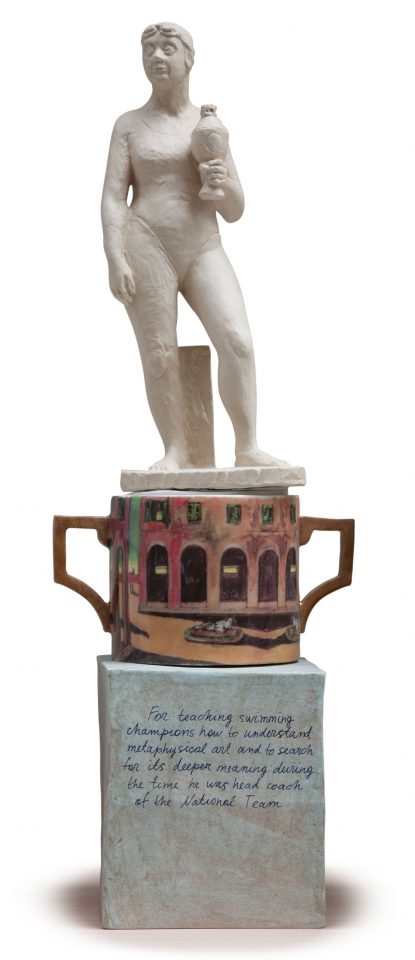 2.1-2aH ~45 cm | For teaching swimming champions how to understand metaphysical art and to search for its deeper meaning during the time he was head coach of the National Team
2.1-2aH ~45 cm | For teaching swimming champions how to understand metaphysical art and to search for its deeper meaning during the time he was head coach of the National Team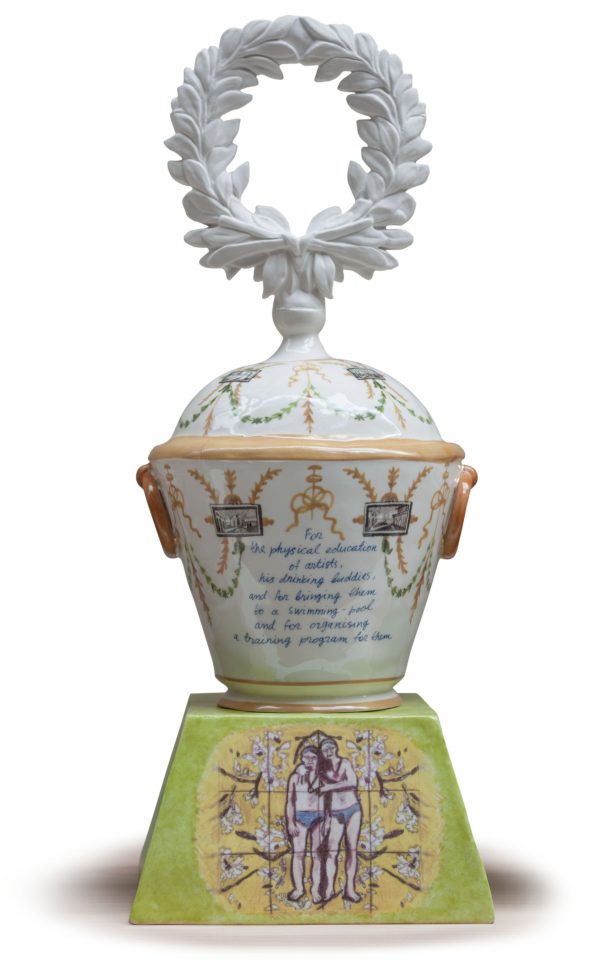 2.1-1H ~48 cm | For the physical education of artists, his drinking buddies, and for bringing them to a swimming pool and for organising a training program for them
2.1-1H ~48 cm | For the physical education of artists, his drinking buddies, and for bringing them to a swimming pool and for organising a training program for them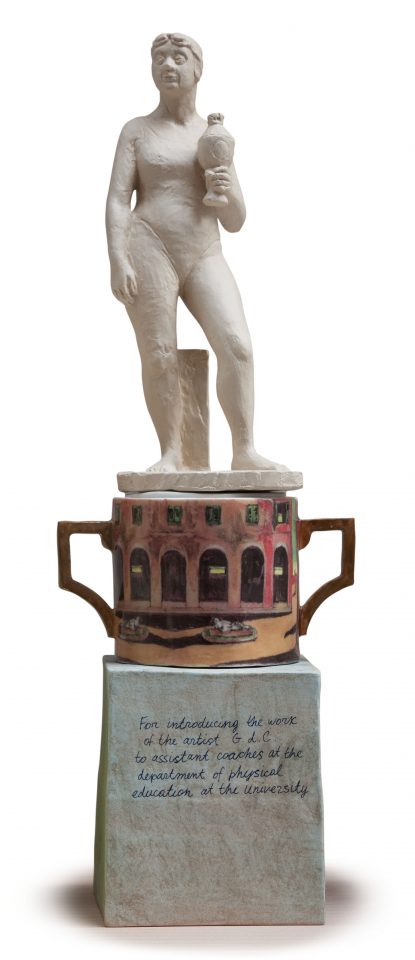 2.1-2bH ~45 cm | For introducing the work of the artist G.d.C. to assistant coaches at the department of physical education at the university
2.1-2bH ~45 cm | For introducing the work of the artist G.d.C. to assistant coaches at the department of physical education at the university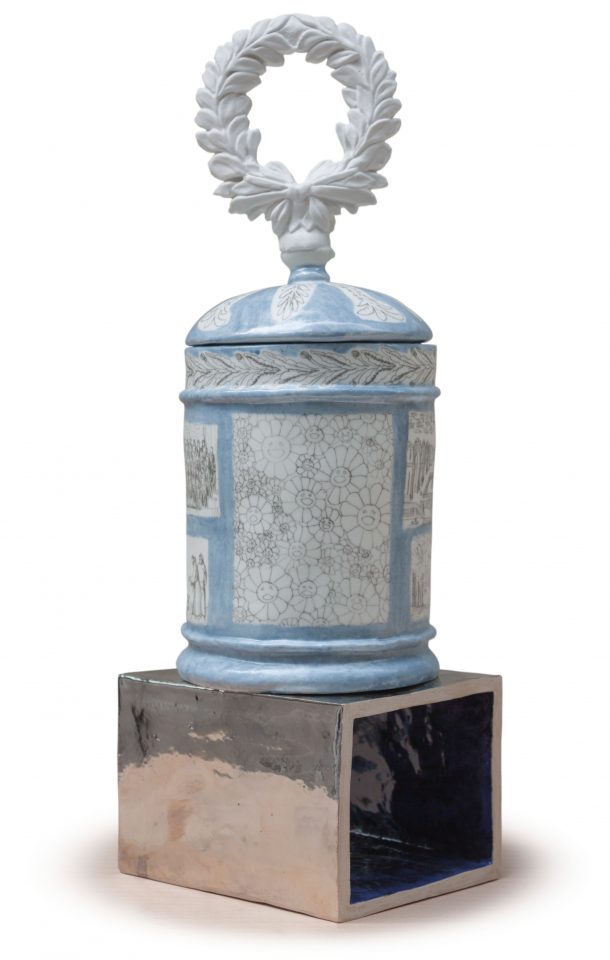 2.1-3bH ~33 cm | For teaching his swimmers to love art and for taking them to museums and art exhibitions on weekends
2.1-3bH ~33 cm | For teaching his swimmers to love art and for taking them to museums and art exhibitions on weekends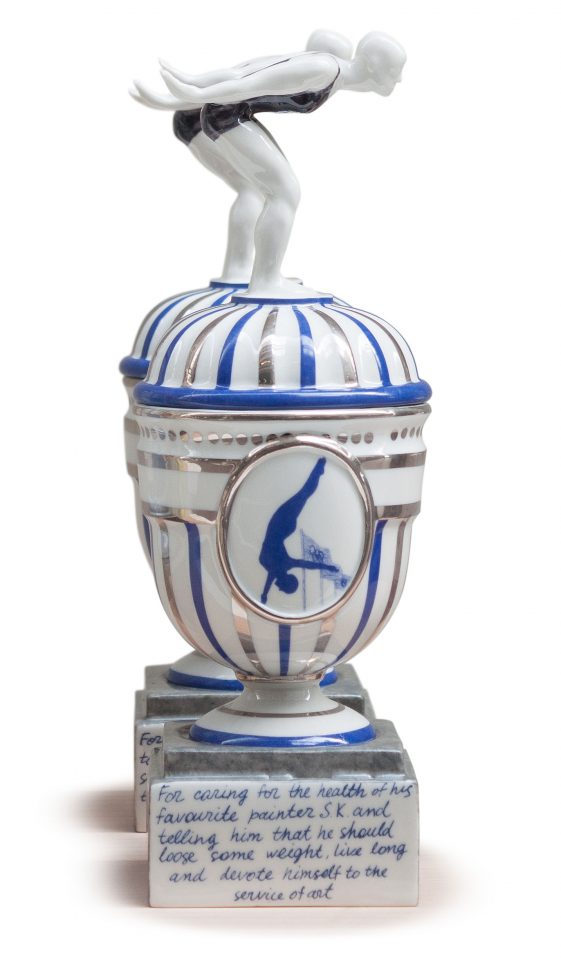 2.1-4c | 2.1-4dH ~25 cm | For caring for the health of his favourite painter S.K. and telling him that he should loose some weight, live long and devote himself to the service of art || H ~25 cm | For teaching the not-very-healthy artist, O.M., in the slow lane of the swimming pool, how to swim
2.1-4c | 2.1-4dH ~25 cm | For caring for the health of his favourite painter S.K. and telling him that he should loose some weight, live long and devote himself to the service of art || H ~25 cm | For teaching the not-very-healthy artist, O.M., in the slow lane of the swimming pool, how to swim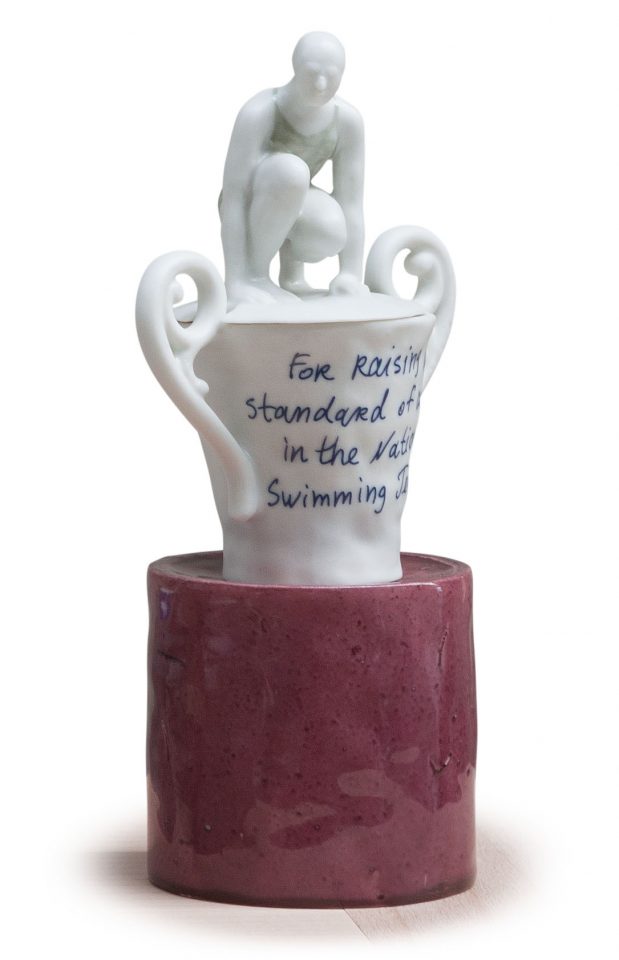 2.1-5bH ~18 cm | For raising the standard of culture in the National Swimming Team
2.1-5bH ~18 cm | For raising the standard of culture in the National Swimming Team-
The Trophy Cups,
or What Could have Happened to My Father.Since my childhood I have already known that one of the biggest misfortunes, which could happen to a person, is to live with the feeling, that you have not realized your talent and just wasted your life. I even remember that chill coming over my heart that this can happen to me as well. I do not know why, but I could hardly imagine anything worse than that.
My father was a swimming coach. He was born in a small village. When he was a child he went regularly to a local river to swim and to exercise, trying to find out his own swimming technique and to improve his results. In other words, he had a vocation to become a coach. I have to smile every time when I try to imagine how my father was coaching himself as a child.
Almost 30 years ago my father was one of the best coaches in the Soviet national swim- ming team. He was very innovative and devoted to his work; he had his own vision of coaching methods. It was extremely important to him to have a success, to get better results, to win. The swimming pool was his second home. After working with him his swim- mers essentially improved their results. That time was a heyday of his career. He was invited to move from provincial Minsk to Leningrad or to Moscow. He was also invited to work as a coach in the USA and Canada; sport magazines were publishing articles about his coaching methods. He told me that at least ten of his swimmers were on their way to Olym- pic medals.
But then some circumstances started to hinder his career. My mother did not want to move to Leningrad or to Moscow. To move abroad was also impossible to my father, because the family could not go with him. Also his straight character and his intransigence to an incom- petence of the sport functionaries had a consequence that he was slowly removed from the leading position. Even to the Olympic games in Canada, where his swimmer won a medal, my father went not as a coach, but as a tourist, watching his victory from stands as an ordi- nary sideliner. For many years his best and most promising swimmers were taken away from him and transferred to other coaches. At a certain moment he became very frustrated and decided to leave the professional sport, feeling totally unrealized and underestimated as a coach. He could prepare many champions, but instead he had to finish his career as an ordinary sport teacher at the University in Minsk.
I always felt that my father had a lot regrets and unrealized ambitions. These days he is devoted to some other than sport matters. He became an art admirer and started to collect paintings. He often goes to the village, where he was born and grown up. He likes to walk there in the places, where he trained himself as a child. And I think he is very happy, because now he sees everything around him with the different eyes, as an artist. I also think, that he always was an artist.
At that time, when he left his job as a coach, he probably thought, that his life was over. But in fact, talent and ambitions can be realized in some other ways and forms than we think, and these ways can make us even happier. As my grandmother would have say about my father’s sport career: "Plague take it!"
So now, in this work, I also try to reflect on, what is at the end a "realization"? Could it take different forms? Maybe the most important thing is not a professional success, but rather that, what is left in shadow, is much more important and valuable?
Supported by the Mondriaan Fonds and The Frozen Fountain.
-